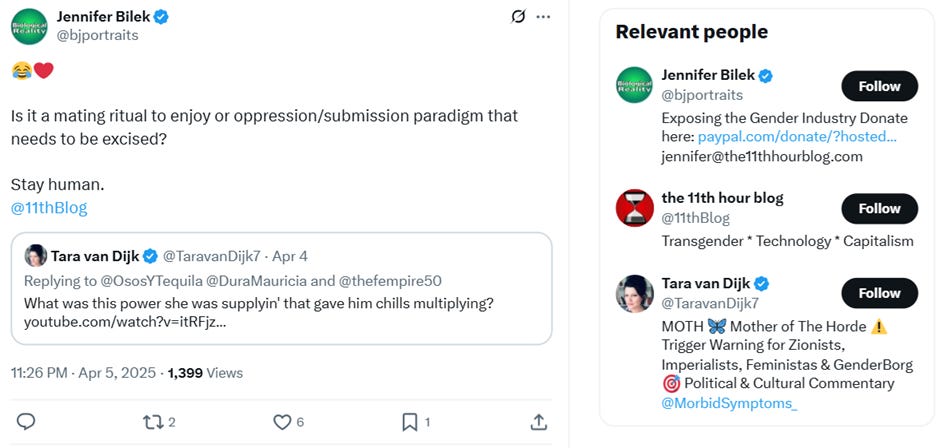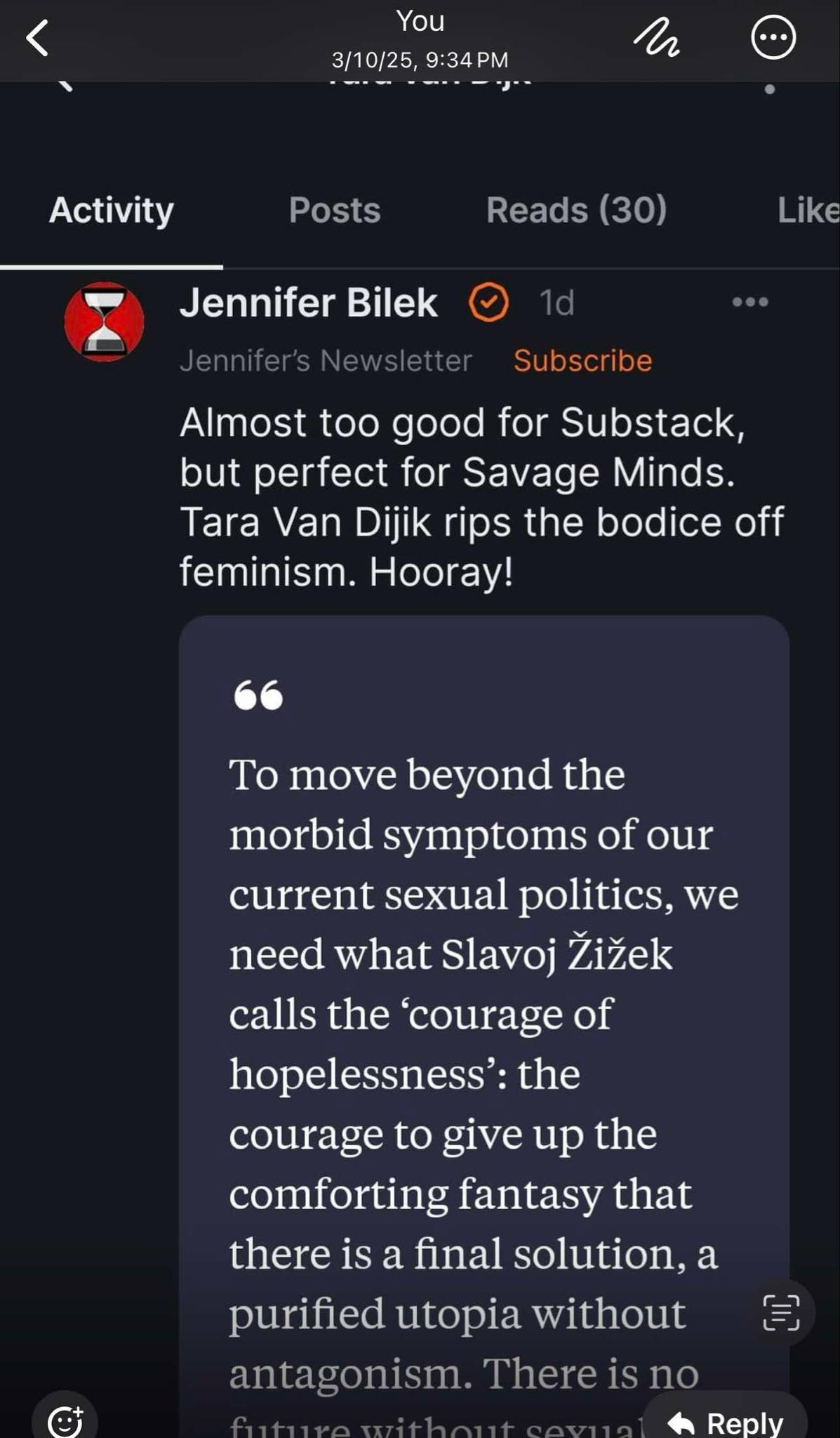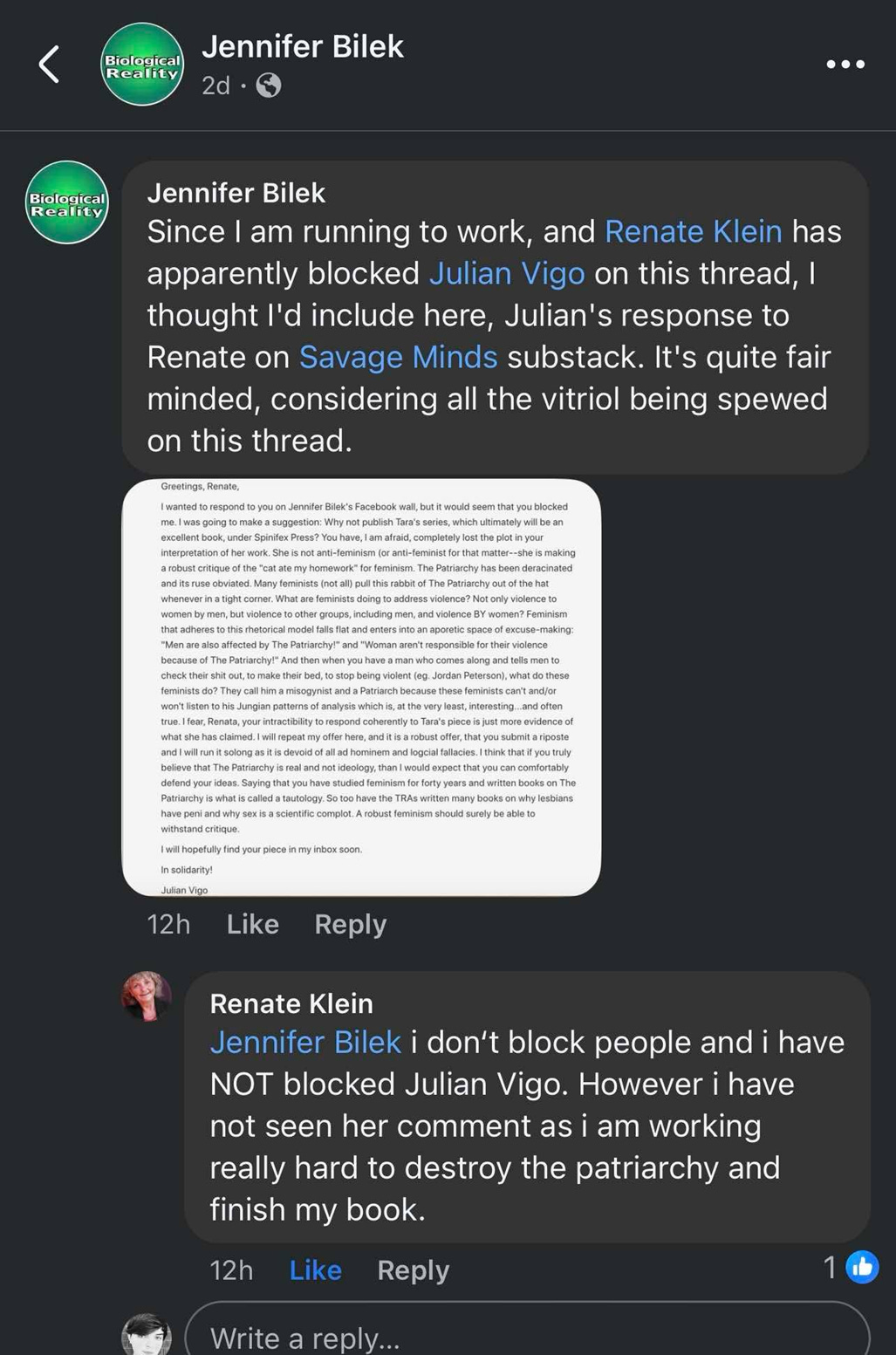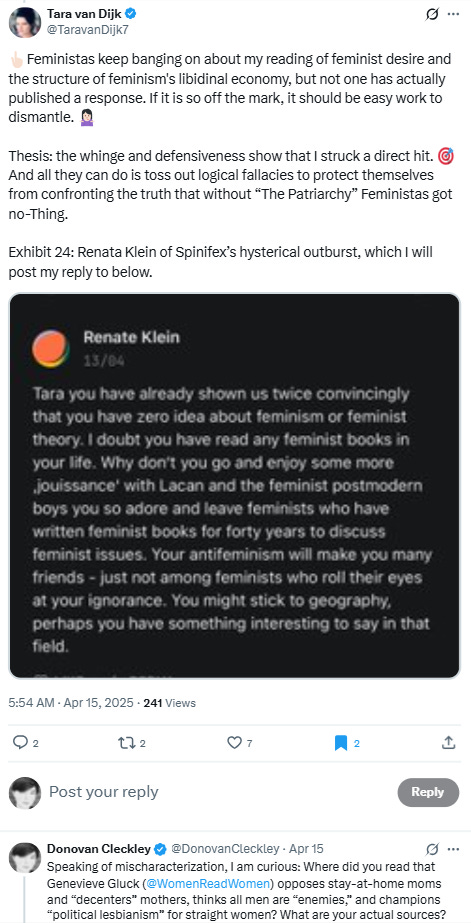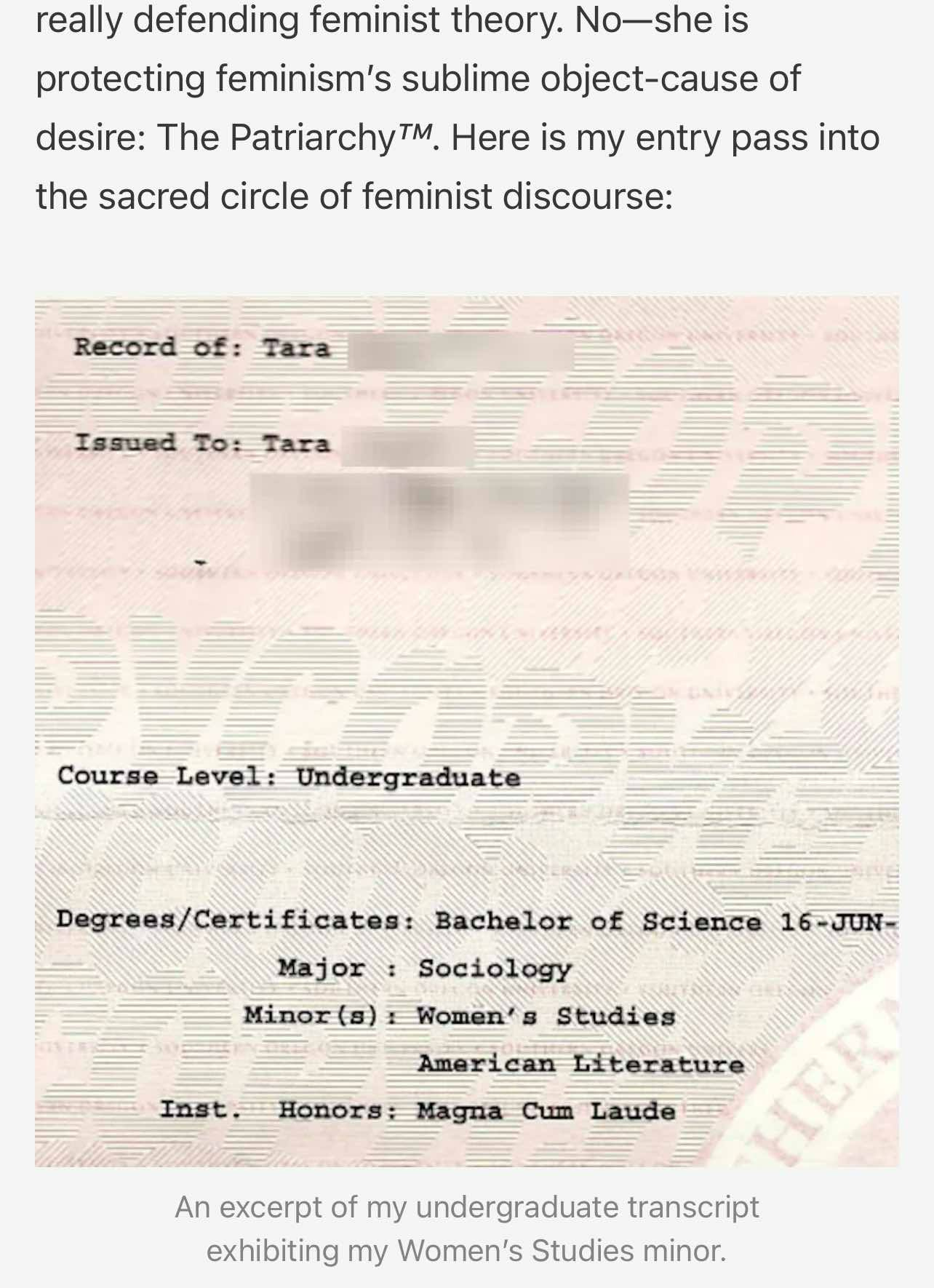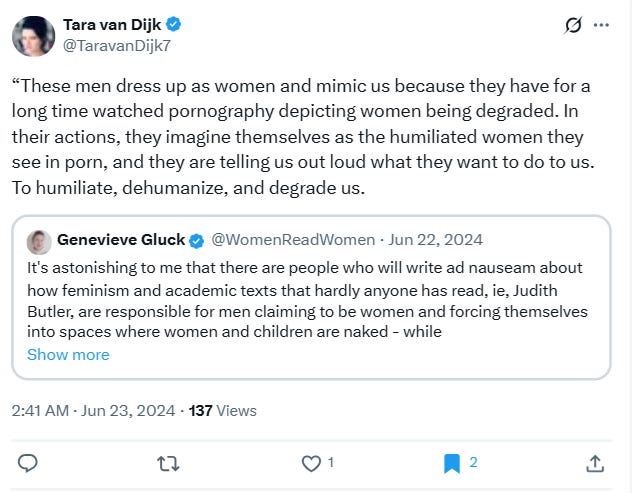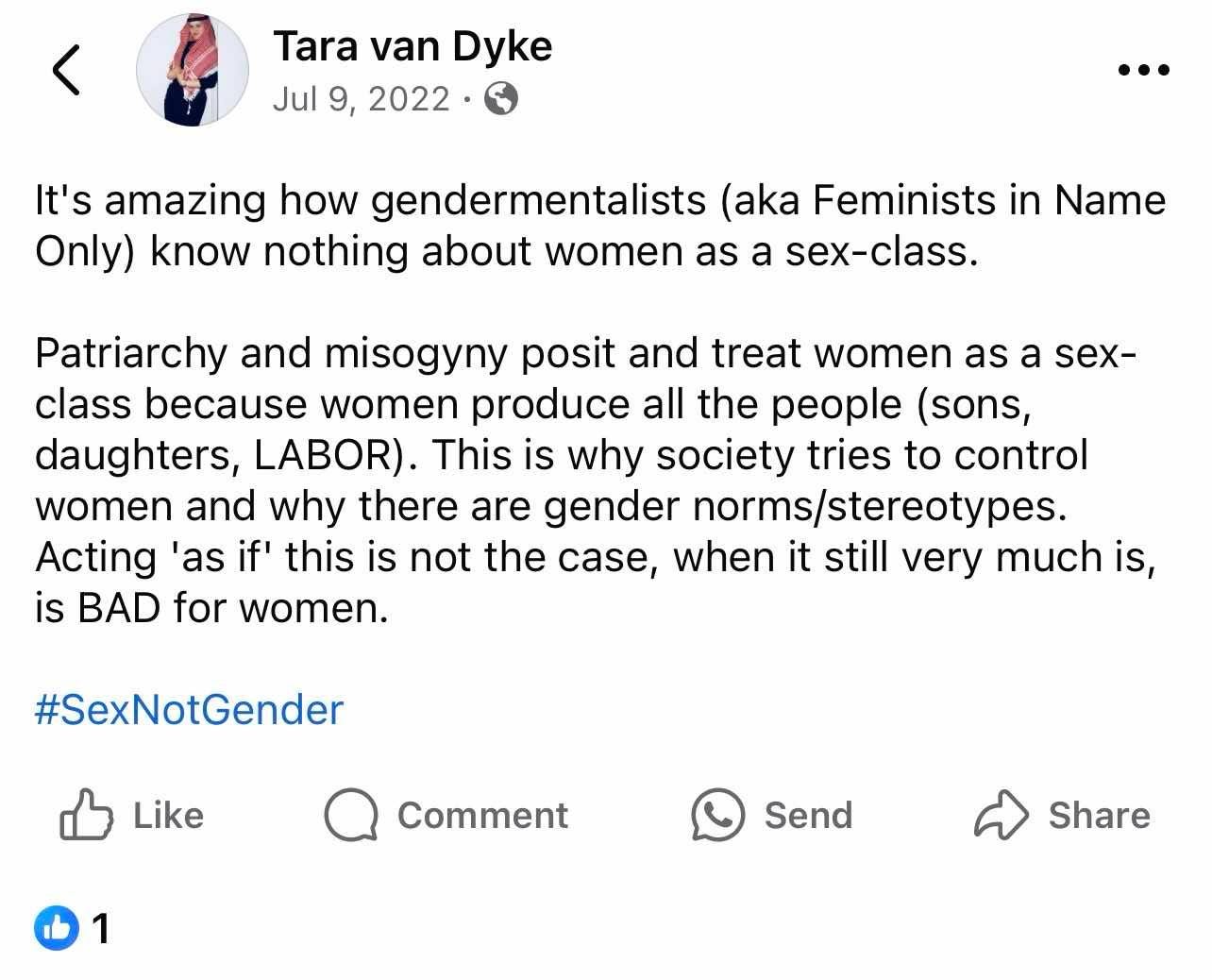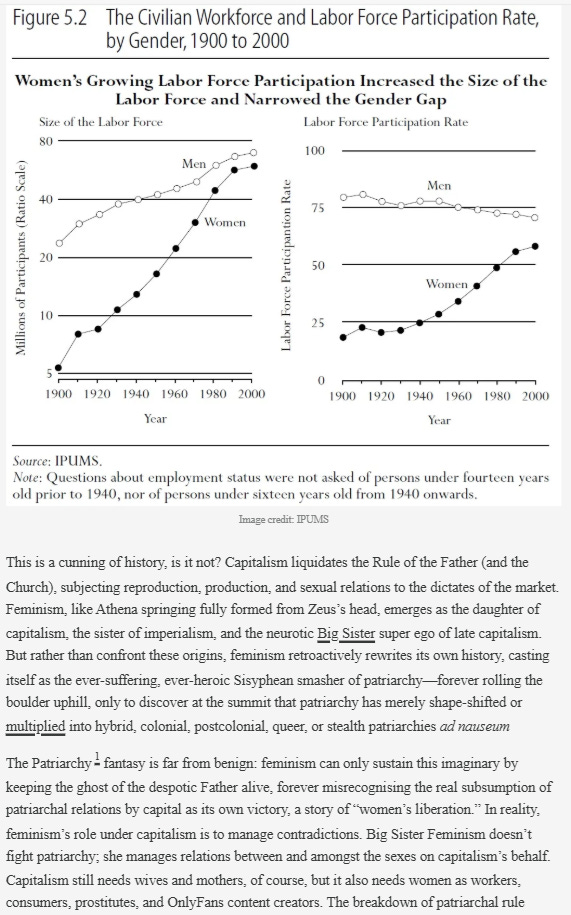Scapegoating Feminism Redux
Sexology, psychoanalysis, and postmodernism walk into a word salad bar…
Professionals of Neurotics
“Theory” can be very misleading in selling confusion as “clarity.”
Psychoanalytic theory and its derivatives have been symptomatic of “theory,” in a religious fundamentalist key, working against clarification, even going as far as imposing obvious mistranslations as “remedies” based on “symptoms.” So-called “cures” become situated on advancing theoretical speculation rather than actually responding to reality. Freud’s “Wolf Man” case, for instance, was an early indication of Freud being a fraud and psychoanalysis being, at best, terrifically speculative along the lines of such long-discarded “sciences” as phrenology.
In psychoanalytic sessions with Freud doing “analysis,” Sergej Pankejeff (1886-1979) discussed having a dream about lying in bed and seeing six or seven white wolves through an open window. Based on his “reading” of “the unconscious,” known for his Interpretation of Dreams (1899), Freud “interpreted” Pankejeff’s dream as being a manifestation of childhood repressed trauma. The group of wolves, Freud claimed, must have been Pankejeff’s parents fucking, which Pankejeff allegedly witnessed in childhood—and which, according to Freud, must have left trauma lodged in “the unconscious.”
Following sessions of analysis with Freud from February 1910 to July 1914 and, briefly, from November 1919 until February 1920, Freud claimed Pankejeff to be “cured,” publicizing this case study as part of psychoanalytic theory’s “success.” Interviewed by Karin Obholzer in the 1970s, toward the end of his life, however, Pankejeff claimed that Freud’s interpretation was “terribly far-fetched”—and Freud knew as much.
Nevertheless, Freud publicized his “Wolf Man” case as indicating the “success” of psychoanalytic theory in treating his patients. Despite his “Wolf Man” case being an obvious failure, Freud utilized these “findings” in his psychoanalytic theory of psychosexual development. In other words, Freud’s claims about “the unconscious” could not be empirically proven and were subjective enough that he could bend “symptoms” to whatever conclusion for publishing as he desired.1
The Fathers and Freud successively established confessionals for neurotics, and it will not be long before they are fitted with domestic appliances.
- Mina Loy, “Conversion,” c. 19302
Feminists have understood the “science” of sexology to be, ironically, about obscuring sexuality from analysis, therefore regulating actual knowledge about sexual relations. Sexology’s obscurantism has been replicated in psychoanalytic theory since Freud, although psychoanalysis has tended more to “the unconscious.” Psychoanalysis and its derivatives have been more professionals of neurotics than confessionals for neurotics.
What with their habits and mode of life, reality is too close to those women to allow them to believe in fantasies. If I had based my theories on the statements of servant girls [sic], they would all be negative. And such behaviour fits in with other sexual peculiarities of that class; well-informed persons assure me that these girls are much less diffident about engaging in coitus than about being seen naked. Fortunately for our therapy, we have previously learned so much from other cases that we can tell these persons their story without having to wait for their contribution. They are willing to confirm what we tell them, but one can learn nothing from them.
- Sigmund Freud to C.G. Jung, June 14, 19073
What is theory, anyway, distinct from “theory”?
Theory should have some evident relation to living reality. When it lacks this quality, it seems worth questioning its purpose and whether it serves more to obscure than clarify understanding the world. The most fundamental problem with theory is the problem of understanding. In a lesser-known 1979 essay, Andrea Dworkin discusses what theory should do—and what it should not:
The purpose of theory is to clarify the world in which we live, how it works, why things happen as they do. The purpose of theory is understanding. Understanding is energizing. It energizes to action. When theory becomes an impediment to action, it is time to discard the theory and return naked, that is, without theory, to the world of reality. People become slaves to theory because people are used to meeting expectations they have not originated—to doing what they are told, to having everything mapped out, to having reality prepackaged. People can have an antiauthoritarian intention and yet function in a way totally consonant with the demands of authority. The deepest struggle is to root out of us and the institutions in which we participate the requirement that we slavishly conform. But an adherence to ideology, to any ideology, can give us the grand illusion of freedom when in fact we are being manipulated and used by those whom the theory serves.4
If theory’s purpose, as Dworkin explains, is clarification toward understanding followed by action, then, ideally, theorists should be neither the enslaved nor the enslavers. Those enslaved by “theory,” living in bondage to expectations alienated from their lives, claim their slavery can free the masses from “symptoms,” despite the fact their own theories merely reinscribe social relations at their worst. Theory at its best is not a word game played to dazzle party guests.
In 2012, Noam Chomsky remarked on “theory,” in quotation marks, and the popularity of Lacan and Žižek throughout academia—its trappings, its mold, its fashion:
What you’re referring to is what’s called ‘theory.’ And when I said I’m not interested in theory, what I meant is, I’m not interested in posturing—using fancy terms like polysyllables and pretending you have a theory when you have no theory whatsoever. So, there’s no theory in any of this stuff, not in the sense of theory that anyone is familiar with in the sciences or any other serious field. Try to find in all of the work you mentioned some principles from which you can deduce conclusions, empirically testable propositions where it all goes beyond the level of something you can explain in five minutes to a twelve-year-old. See if you can find that when the fancy words are decoded. I can’t. So, I’m not interested in that kind of posturing. Žižek is an extreme example of it. I don’t see anything to what he’s saying. Jacques Lacan I actually knew. I kind of liked him. We had meetings every once in a while. But quite frankly I thought he was a total charlatan. He was just posturing for the television cameras in the way many Paris intellectuals do. Why this is influential, I haven’t the slightest idea. I don’t see anything there that should be influential.5 (emphasis added)
Theory is what it does. If it does nothing, then it is nothing. Appropriations of Freud/Lacan/Žižek can very quickly turn into “theory” in “posturing for the television cameras in the way many Paris intellectuals do.” With Dworkin, Chomsky agrees that theory should involve clarification rather than confusion. In other words, the point should not be “the fancy words” being symbol without substance.
Mina Loy was right, in a way, that tools of all kinds, domestic and otherwise, would be fit to psychoanalyze.
Sheila Jeffreys (1985, 1990) and Margaret Jackson (1984a, 1984b) have both argued that certain nineteenth- and twentieth-century theories of sexuality were elaborated in the face of feminist gains, and served to organize hostility to women who were autonomous socially and sexually. The work of Havelock Ellis [1859-1939] in particular can be seen as a response to growing feminist campaigns against male sexual violence. Sexology was elaborated to reinforce and restabilize masculine supremacy Flight from the masculine paradigm was labelled sick and deviant, now it is simply called essentialist. . . . We could substitute ‘Lacan’ for ‘Ellis’ to see what this new French sexology corresponds to, and how it responds to our contemporary feminist campaigns against sexism in the media and in language, and writings on feminine pleasure. Lacan tells us that women are biologically incapable of representing the phallus, are eternally secondary citizens in the symbolic order, and can only come through the phallus.
- Somer Brodribb, Nothing Mat(t)ers: A Feminist Critique of Postmodernism6
Postmodernism has utilized sexology and psychoanalysis as theories of sexuality in ways that frequently go misunderstood outside radical feminist critiques of postmodernism. The linguistic domination throughout academia has been part of a thorough effort to deprive women of what Mary Daly has termed “the power of naming.”7 Female erasure under the symbol of femininity in postmodernist discourse follows theories of sexuality that have naturalized the idea of women as not only inferior to men but also existing for male expression.
Word Salad Bar
Through the word—which is already a presence made of absence—absence itself comes to be named in an original moment whose perpetual recreation Freud’s genius detected in a child’s game. And from this articulated couple of presence and absence—also sufficiently constituted by the drawing in the sand of a simple line and a broken line of the koua mantics of China—a language’s [langue] world of meaning is born, in which the world of things will situate itself. Through what becomes embodied only by being the trace of a nothingness and whose medium thus cannot be altered, concepts, in preserving the duration of what passes away, engender things. For it is still not saying enough to say that the concept is the thing itself, which a child can demonstrate against the Scholastics. It is the world of words that creates the world of things—things which at first run together in the hic et nunc of the all in the process of becoming—by giving its concrete being to their essence, and its ubiquity to what has always been: κτῆμα ἐς ἀεί. Man thus speaks, but it is because the symbol has made him man.
- Jacques Lacan, “The Function and Field of Speech and Language in Psychoanalysis,” 1953, in Écrits8
In Lacan, as in Irigaray’s post-Lacanian reformulation of Freud, sexual difference is not a simple binary that retains the metaphysics of substance as its foundation. The masculine ‘subject’ is a fictive construction produced by the law that prohibits incest and forces an infinite displacement of a heterosexualizing desire. The feminine is never a mark of the subject; the feminine could not be an ‘attribute’ of a gender. Rather, the feminine is the signification of lack, signified by the Symbolic, a set of differentiating linguistic rules that effectively create sexual difference. The masculine linguistic position undergoes individuation and heterosexualization required by the founding prohibitions of the Symbolic law, the law of the Father. The incest taboo that bars the son from the mother and thereby instates the kinship relation between them is a law enacted ‘in the name of the Father.’ Similarly, the law that refuses the girl’s desire for both her mother and father requires that she take up the emblem of maternity and perpetuate the rules of kinship. Both masculine and feminine positions are thus instituted through prohibitive laws that produce culturally intelligible genders, but only through the production of an unconscious sexuality that reemerges in the domain of the imaginary.
- Judith Butler, Gender Trouble: Feminism and the Subversion of Identity9
Fantasy positivises lack. It provides a name and cause, and therefore a solution: ‘You suffer because of X. If X were removed or overcome, you would finally be free, fulfilled, or complete.’ This is the libidinal logic of fantasy. It does not deny lack, it narrates it. In Lacan’s formula for fantasy (S̷ ◊ a), the split subject (S̷) has an imagined relation to the objet petit a (the object-cause of desire) the interchangeable stand-in for the Thing that was never possessed in the first place. Any object can become an objet a for the libidinal economy. In feminism, The Patriarchy plays this role. It becomes the imagined obstacle. The X that stands in the way of women’s liberation, wholeness, or full recognition. The fantasy promises: Only when The Patriarchy is fully dismantled will women become free, autonomous, complete subjects. And yet, this moment never arrives. The Patriarchy always recedes, shifts, multiplies. Because the truth is: no-thing will ever fill the negativity that constitutes the subject. Alienation is not a bug, it’s a feature of social reality.
- Tara van Dijk, “Enjoy Patriarchy!” Savage Minds, May 5, 2025

Freud is unnecessary to the future.
- Mina Loy, “History of Religion and Eros,” c. 195010
Tara van Dijk has been published to Jennifer Bilek’s 11th Hour Blog and Julian Vigo’s Savage Minds with the following essays: “FEMINISTS TO THE PATRIARCHY: WE HATE YOU, DON’T STOP!” and “Feminist’s Fetishistic Disavowal.” For interested readers, I have made a point of using Internet Archive links to deny Bilek and Vigo more clicks to their publications. These are both the same piece, but the shorter version appeared on Bilek’s 11th Hour Blog on February 9, with the longer version appearing on Vigo’s Savage Minds on March 9. Dijk’s most recent piece, from May 5, is titled “Enjoy Patriarchy!”—also published to Vigo’s Savage Minds.
Invoking the imagery of a man raping a woman, Bilek shared Dijk’s work to Substack on March 9 claiming that it “rips the bodice off feminism.” In an email to Renate Klein of Spinifex Press, which Bilek shared publicly on her Facebook page in the comments on May 7, Vigo claimed, “The Patriarchy [as a concept of analysis] has been deracinated and its ruse obviated.” “Why not publish Tara’s series [‘A Pervert’s Guide to Feminism’], which ultimately will be an excellent book, under Spinifex Press?” Vigo asked Klein. In a comment to Klein on May 8, Dijk replied, “If you can’t handle critique, stay in the kitchen.” Dijk’s comment recalls Bilek herself writing, on April 6, “Don’t leave the kitchen if you can’t handle the heat. I’m serious. You WILL hurt yourself. LOL.”
Bilek, Vigo, and Dijk have trashed feminism and feminists and have viciously taunted and mocked anybody who questions their obvious bad faith. They have claimed what they have been doing qualifies as “critique,” intended for “conversation,” but their online behavior has suggested otherwise. How Bilek, Vigo, and Dijk have trashed other women demands that women and men who have supported them ask hard questions about integrity. It seems worth questioning why long-time critics of transgenderism like Bilek and Vigo have become so enamored with Lacanian psychoanalysis in Dijk’s trashing of feminism and feminists. What does Bilek’s audience think of her facilitating and enabling unwarranted attacks on feminists like Renate Klein and Genevieve Gluck in the name of a “critique of feminism”?
Don’t leave the kitchen if you can’t handle the heat.
I’m serious. You WILL hurt yourself. LOL.
Stay human.
@11thBlog
- Jennifer Bilek (@bjportraits), X, April 6, 2025, 8:16 AM
Is it a mating ritual to enjoy or oppression/submission paradigm that needs to be excised?
Stay human.
@11thBlog
- Jennifer Bilek (@bjportraits), X, April 5, 2025, 11:26 PM
Here is Bilek complimenting Dijk on how she is “brutal”—adding “But it may be necessary at this stage”:
[laughing emoji] you’re brutal! But it may be necessary at this stage.
- Jennifer Bilek (@bjportraits), X, April 5, 2025, 11:57 PM
Almost too good for Substack, but perfect for Savage Minds. Tara Van Dijik [sic] rips the bodice off feminism. Hooray!
- Jennifer Bilek, Substack, March 10, 2025
Here is the full text of Vigo’s email sent to Klein:
Greetings, Renate,
I wanted to respond to you on Jennifer Bilek’s Facebook wall, but it would seem that you blocked me. I was going to make a suggestion: Why not publish Tara’s series [“A Pervert’s Guide to Feminism”], which ultimately will be an excellent book, under Spinifex Press? You have, I am afraid, completely lost the plot in your interpretation of her work. She is not anti-feminism (or anti-feminist for that matter—she is making a robust critique of the ‘cat ate my homework’ for feminism. The Patriarchy has been deracinated and its ruse obviated. Many feminists (not all) pull this rabbit of The Patriarchy out of the hat whenever in a tight corner. What are feminists doing to address violence? Not only violence to women by men, but violence to other groups, including men, and violence BY women? Feminism that adheres to this rhetorical model falls flat and enters into an aporetic space of excuse-making: ‘Men are also affected by The Patriarchy!’ and ‘Woman [sic] aren’t responsible for their violence because of The Patriarchy!’ And then when you have a man who comes along and tells men to check their shit out, to make their bed, to stop being violent (eg, Jordan Peterson), what do these feminists do? They call him a misogynist and a Patriarch because these feminists can’t and/or won’t listen to his Jungian patterns of analysis which is [sic], at the very least, interesting...and often true. I fear, Renata [sic], your intractibility [sic] to respond coherently to Tara’s piece is just more evidence of what she has claimed. I will repeat my offer here, and it is a robust offer, that you submit a riposte and I will run it solong [sic] as it is devoid of all ad hominem and logcial [sic] fallacies. I think that if you truly believe that The Patriarchy is real and not ideology, than [sic] I would expect that you can comfortably defend your ideas. Saying that you have studied feminism for forty years and written books on The Patriarchy is what is called a tautology. So too have the TRAs written many books on why lesbians have peni [sic] and why sex is a scientific complot. A robust feminism should surely be able to withstand critique. I will hopefully find your piece in my inbox soon.
In solidarity!
Julian Vigo
There is a lot in this wall of text, so I will point out (1) how much I hate the word “robust,” as Vigo keeps repeating it, and (2) the sheer arrogance to write to Klein in this way. My favorite part is the word “logical” being misspelled. Given Vigo’s use of the disaster in Gaza for Savage Minds commentary, talking about “Zionism,” it surprises me that she thinks so highly of Jordan Peterson teaching men “to stop being violent,” that she actually names him as some exemplar above feminists who critique him. In a widely shared post on X, on October 7, 2023, Peterson wrote, “Give em’ hell, Netanyahu”—which seems like something Vigo would keep in mind, seeing as Savage Minds has published work condemning Israel—work also shared by Bilek. So much for those “Jungian patterns of analysis” ending militarism.
Responding to Klein’s comment expressing shock at Bilek and Vigo platforming Dijk’s “cheap attack,” which has been a trashing of feminism and feminists, Dijk replied:
Pot, meet kettle. I only analyzed your public comment to me—which is fair game. If someone serves up a perfect example of the very argument I’m making, there’s no ethical reason not to use it. It was a teachable moment, to use the parlance of our times. If you can’t handle critique, stay in the kitchen. (emphasis added)
Here is Dijk’s published work to Bilek’s and Vigo’s platforms, all converted to Internet Archive links, as noted above:
“FEMINISTS TO THE PATRIARCHY: WE HATE YOU, DON’T STOP!” The 11th Hour Blog, February 9, 2025, https://web.archive.org/web/20250304105839/https://www.the11thhourblog.com/post/feminists-to-the-patriarchy-we-hate-you-don-t-stop.
“Feminist’s Fetishistic Disavowal,” Savage Minds, March 9, 2025, https://web.archive.org/web/20250310113637/https://savageminds.substack.com/p/feminists-fetishistic-disavowal.
“Enjoy Patriarchy!” Savage Minds, May 5, 2025, https://web.archive.org/web/20250506234155/https://savageminds.substack.com/p/enjoy-patriarchy.
From the start, Dijk argues that “capitalism smashed the patriarchy because a regime of fixed sex-based roles, rigid hierarchical authority, and paternal control over both household and women’s sexuality were incompatible with its forces of production.” This is nonsense. Dijk provides no sufficient evidence to support the claims she makes in either version of her essay—and, ironically, the longer one actually clarifies even less, despite its length.
I sent a critique to Bilek on February 22, but she claimed that she very conveniently went on “a beautiful sabbatical” right after publishing Dijk’s piece to The 11th Hour Blog on February 9—and, since then, has interestingly blocked me on social media.
Since she published my essay titled “Transgenderism and the Scapegoating of Feminism,” critiquing Matt Walsh in 2023, I figured that, in the spirit of “conversation,” Bilek would be willing to publish an opposing point of view alongside Dijk’s. However, she would not consider my piece for The 11th Hour Blog and claimed she would “eventually” get to reading it. Bilek insisted that I had to publish my critique on Vigo’s Savage Minds.
I already had some writing at The 11th Hour Blog, so why should I have to publish elsewhere to write a response to what appeared on The 11th Hour Blog?
Or, Bilek “generously” suggested, I could talk with Dijk on the Morbid Symptoms “podcast” that virtually nobody cares about, having a “conversation” about what seemed to me then and now to be posturing. “She is a gracious host as long as she is not attacked,” Bilek assured me—which I knew was bullshit. The fact that Dijk’s work trashes feminism and feminists under the guise of “critique” makes it difficult not to point out the irony in demanding good faith in response to bad faith.
Having a “Conversation”
Here is my own exchange with Dijk on X, where she reposted my post recommending aurora linnea’s Man Against Being: Body Horror and the Death of Life and claimed that she intended on reviewing linnea’s book:
DIJK: So, the Feministas have moved on from applying their patriarchy test to a mischaracterization of Foucault to applying it to one of Sartre.
This book sounds so bad it’s good, like Rings of Power.
Look forward to reviewing it [devil horn emoji] @spinifexpress
CLECKLEY: I really hope you will make an extra effort to do the reading, but, given your “analyses,” I very seriously doubt it. The irony must escape you that you quite blatantly mischaracterize radical feminists. Perhaps that is your own “morbid symptom”—apart from your narcissistic rage.
DIJK: [pointing finger emoji] Feministas keep banging on about my reading of feminist desire and the structure of feminism’s libidinal economy, but not one has actually published a response. If it is so off the mark, it should be easy work to dismantle. [woman shrugging her shoulders emoji]
Thesis: the whinge and defensiveness show that I struck a direct hit. [target emoji]
And all they can do is toss out logical fallacies to protect themselves from confronting the truth that without “The Patriarchy” Feministas got no-Thing. Exhibit 24: Renata [sic] Klein of Spinifex’s hysterical outburst, which I will post my reply to below.
CLECKLEY: Speaking of mischaracterization, I am curious: Where did you read that Genevieve Gluck (@WomenReadWomen) opposes stay-at-home moms and “decenters” mothers, thinks all men are “enemies,” and champions “political lesbianism” for straight women? What are your actual sources?
DIJK: And now, a desperate goalpost move from the barely-beta Feminista man-scot. The image showcases a sample of public Feministas—not every one exhibits all these traits, but the pattern is real, persistent, and easy to spot. [butterfly emoji]
DIJK: Donnie, if you keep teeing these up like this, the Feministas are gonna start thinking you’re a double agent [laughing emoji].
Since you tagged her, I’ll just take this opportunity to note: The Gluck is a textbook pervert—psychoanalytically speaking, of course. [butterfly emoji]
CLECKLEY: Provide your sources. Making claims without support is your very “morbid symptom,” playing Lacanian word association without any evidence. Is any woman who critiques the sex industry, like Gluck, “a textbook pervert—psychoanalytically speaking, of course”?
DIJK: Tell us you know nothing about the critique of ideology without telling us, Donnie.
Thanks for the QT [kissy face emoji]
CLECKLEY: Comments are not quote tweets, very surprisingly enough—not that pesky little facts ever get in your way. Anyway, I am curious: Are you liking your own comments with your other account? This is just really hilarious—not supporting your claims is “the critique of ideology”? [clown face emoji]
This woman is who Bilek and Vigo, known for their “investigative reporting,” have published to The 11th Hour Blog and Savage Minds—despite the fact that Dijk openly admits her “critique of ideology” amounts to claims without support.
Refusing to Read by Degree
Renate Klein has pointed out that Dijk obviously lacks pretty basic knowledge of feminist books written over the last half century, such as Maria Mies’s 1986 book Patriarchy and Accumulation on a World Scale: Women in the International Division of Labour. Mies’s book is one among many, written over decades, especially since the 1980s, sufficiently addressing Dijk’s “new” claims about patriarchy and how capitalism developed after it. Instead of considering her lack, however, Dijk’s reply has been her minor in Women’s Studies, which she has referred to as her “entry pass into the sacred circle of feminist discourse.”
Do those with majors or minors in other fields of study typically flash their degrees when it seems they lack knowledge in the sense of actually having learned anything while at university? Having a degree is evidently not the same as knowing how to read. Universities have produced more than enough formally “educated” illiterates.
Anyway, here is some of my critique that Bilek would not publish to The 11th Hour Blog:
A leading women’s historian, quite widely referenced during the Second Wave, Lerner did not argue [in The Creation of Patriarchy (1986)] that male dominance is ‘a timeless, universal force,’ and her view of patriarchy as a historical system was common among feminists of the 1970s and 1980s. As much as she quotes Lacan and Žižek, two male thinkers, Dijk provides no quote from any second-wave feminist thinker whatsoever claiming that patriarchy is ‘a timeless, universal force.’ Setting aside the Lacanian dressing Dijk uses, we have misrepresentation as the basis for her ‘argument,’ simply just ignoring evidence that contradicts it. Dijk asserts her claim and then presents her reassertions as the supporting ‘evidence’ for her claim. Speculation through psychoanalytic theory comes to cover up what Dijk’s ‘argument’ lacks in serious engagement with the ideas of the Second Wave.
On February 18, Bilek shared Dijk’s essay titled “The Perverse Feminist” about Genevieve Gluck and wrote the following:
I find these posts, and analysis of feminists [sic] attachment to “The Patriarchy” absolutely fascinating.
I’ve seen myself in the first two, though not so much here.
This one reminds me of a book by Jane Caputi, ‘The Age of Sex Crimes,’ [sic] where she points out how the very promotion and scintillating stories about serial killers actually caused their proliferation.
Stay human.
@11thBlog
- Jennifer Bilek (@bjportraits), X, February 18, 2025, 5:47 PM
Bilek further commented, in reply to a woman saying she loves Dijk’s posts about women, that the word “jouissance” (just Lacanian jargon) is “perfect”:
Me too. They’re a slice of genius.
- Jennifer Bilek (@bjportraits), X, February 18, 2025, 6:01 PM
Bilek seems to think that critiquing sexual objectification, as Gluck does, contributes to its “proliferation,” which is not what Caputi argues in The Age of Sex Crime, a book that Bilek seems not to have read—given Caputi’s discussion of patriarchy.
The Politics of Shapeshifting
I could have ignored Bilek and Vigo being suckers for poorly argued work since they have form not exactly having great editorial standards at The 11th Hour Blog and Savage Minds. Dijk’s writing comes off as soulless and mindless, as if AI-generated—or, at least, partly AI-generated, since she already has used AI for “her” woman-hating “artwork.” As noted above, Renate Klein and Genevieve Gluck have been two of Dijk’s targets. Dijk has branded Klein “a textbook feminist hysteric,” repeated on Vigo’s Savage Minds (ironic that Vigo demands no ad hominem in response), and has branded Gluck “a textbook pervert—psychoanalytically speaking, of course.” In fact, she has written her “perverse feminist” writing on Gluck, in particular, content that Bilek has shared, as documented above.
Although only a few women actually engage in trashing, the blame for allowing it to continue rests with us all. Once under attack, there is little a woman can do to defend herself because she is by definition always wrong. But there is a great deal that those who are watching can do to prevent her from being isolated and ultimately destroyed. Trashing only works well when its victims are alone, because the essence of trashing is to isolate a person and attribute a group’s problems to her. Support from others cracks this facade and deprives the trashers of their audience. It turns a rout into a struggle. Many attacks have been forestalled by the refusal of associates to let themselves be intimidated into silence out of fear that they would be next. Other attackers have been forced to clarify their complaints to the point where they can be rationally dealt with.
- Joreen/Jo Freeman, “Trashing: The Dark Side of Sisterhood,” Ms., April 197611
Although Bilek and Vigo seem very unaware, I happen to know that, as late as fall 2024, Dijk attempted to use a radical feminist analysis, but she was not finding the desirable clicks/cliques, so Dijk shapeshifted into February 2025.
Over the past few years, I have seen Dijk online in “gender-critical” spaces trying to make a name for herself by being overly friendly, in a very parasitic fashion, toward writers with larger platforms. In retrospect, Dijk’s flattery has seemed like a strategy in finding a host to parasitize, any sizable figure narcissistic and gullible enough to be used. One of her prospective hosts was actually Genevieve Gluck, whom Dijk went from claiming to admire to despising—partly, I think, because Genevieve clocked Dijk for being manipulative and disingenuous.
Narcissists pivot from idealization to devaluation, admiration to contempt, typically coinciding with not receiving the attention they desire or not finding affirmation for their grandiose sense of self-importance.
As recently as August 1, 2024, Dijk critiqued a man who scapegoated feminism for transgenderism:
There is plenty of blame to go around, Auron.
Feminists, small in number, are VERY divided on this issue. And I don’t f*ck with transmaids.
The beating heart of this issue is men’s desires, not women’s.
@Genevieve_Gluck’s work makes this crystal clear.
So you are just another whinge beta who can [middle finger emoji] off. (emphasis added)
Auron MacIntyre wrote:
This is why, despite her selective outrage on trans issues, Rowling is just a temporarily embarrassed lib
Men do not want this, feminists laid the groundwork and women are the ones who have defended the trans movement
This is a self-inflicted wound
Prior to branding Gluck a “perverse feminist,” Dijk referenced her alongside Jennifer Bilek “for systematic looks at how we got here” on August 22, 2023.
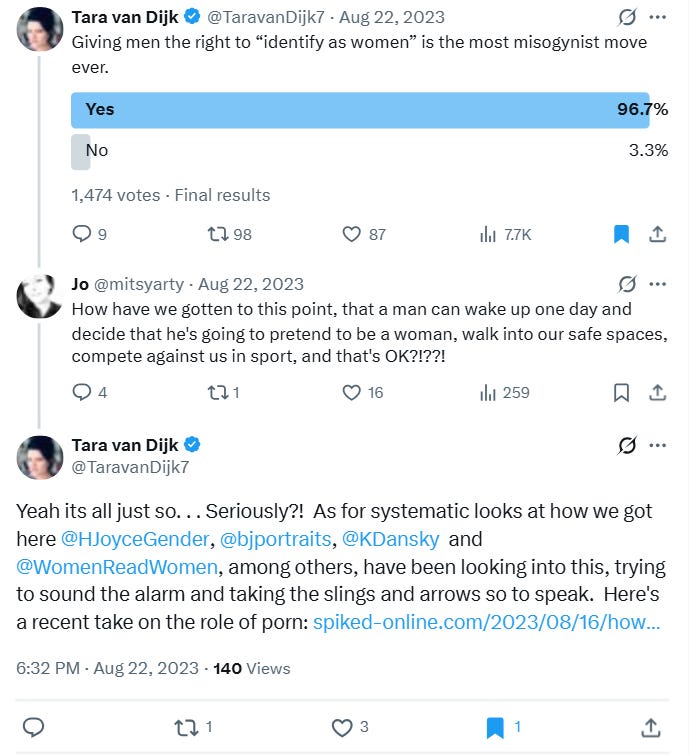
The piece Dijk linked in her post is Gluck’s essay “How Pornography Forged the Trans Movement.”
On June 23, 2024, Dijk quoted Gluck positively, similar to having endorsed Gluck’s critique one year before:
On February 8, 2025, one day before her “FEMINISTS TO THE PATRIARCHY: WE HATE YOU, DON’T STOP!” essay appeared on Bilek’s 11th Hour Blog, Dijk recommended Gluck alongside Bilek and Dansky, noticeably missing Helen Joyce, whom Bilek has falsely accused of plagiarism.
Following the publication of Dijk’s piece, Bilek insisted that feminists need to “explore these ideas”—like Dijk claiming that women fantasize about being oppressed, and women’s oppression is their “fetish.” To which Gluck thoughtfully replied:
You published a poorly written opinion piece which, in a transparent appeal to authority, leans heavily on quotes from male postmodernists—while simultaneously arguing that feminism isn’t based in material reality. Then you accuse critics of behaving irrationally.
- Genevieve Gluck (@WomenReadWomen), February 9, 2025, 11:25 PM

Genevieve Gluck @WomenReadWomen (ironically enough) just pulled another ‘Gluck and Duck.’ [emoji of a trophy] I accept her surrender.
The PatFems (Patriarchy Feminists) are a hoot! [laughing emoji]
‘Your argument is so weak I won’t engage with it’—right after knee-jerking twice.
‘Engaging is a waste of energy’ aka ‘I can’t actually refute this, so I’ll pretend I’m above it.’
- Tara van Dijk (@TaravanDijk7), X, February 10, 2025, 10:41 AM
Jumping to April 10, 2025, Dijk has this piece titled “Hey Ladies—Are You in an Abusive Relationship with the Feministas?” (Internet Archive link) with a collage featuring the faces of women, including Gluck, as symptomatic “breeds of woman.”


This essay came to mind when I asked Dijk where in Gluck’s work she argues for anything Dijk charges in her “critique of ideology” that merely trashes women of very different views and refuses to separate them ideologically. To quote Joreen’s essay on trashing again:
There is, of course, a fine line between trashing and political struggle, between character assassination and legitimate objections to undesirable behavior. Discerning the difference takes effort. Here are some pointers to follow. Trashing involves heavy use of the verb ‘to be’ and only a light use of the verb ‘to do.’ It is what one is and not what one does that is objected to, and these objections cannot be easily phrased in terms of specific undesirable behaviors. Trashers also tend to use nouns and adjectives of a vague and general sort to express their objections to a particular person. These terms carry a negative connotation, but don’t really tell you what’s wrong. That is left to your imagination. Those being trashed can do nothing right. Because they are bad, their motives are bad, and hence their actions are always bad. There is no making up for past mistakes, because these are perceived as symptoms and not mistakes.12 (emphasis added)
Dijk’s “critique” addresses these women as “new breeds of woman,” among epithets about what they are rather than what they do, obviously divorced from critiquing what they have actually written. Unconscious of the profound irony, she writes, “Choose reality over conspiracy theory and gender delusion.” Apparently, this level of nonsense is what Bilek and Vigo consider “a slice of genius” and “robust critique.”
Politics as Performance
Here is a public post from Dijk’s Facebook, under the name “Tara van Dyke,” dated July 9, 2022:
It’s amazing how gendermentalists (aka Feminists in Name Only) know nothing about women as a sex-class.
Patriarchy and misogyny posit and treat women as a sex-class because women produce all the people (sons, daughters, LABOR). This is why society tries to control women and why there are gender norms/stereotypes. Acting ‘as if’ this is not the case, when it still very much is, is BAD for women.
#SexNotGender13 (emphasis added)
The worst thing that ever happened to Women’s Studies is Gender Studies (aka third wave - keep the name -feminism).
It went from critiquing gender roles/stereotypes to reifying them (gender identity) and casting the hawking of synthetic gender identities via pharmaceuticals and surgical body modifications (Big Gender) as ‘stunning and brave.’
But ya gotta give the devil they/their due - it was quite the passive/palace revolution.14
Contrasting 2025 Dijk, 2022 Dijk acknowledged that people who “self-identify” as “feminists” can be “feminists in name only,” implying an understanding that not everybody “self-identifying” as “feminist” is feminist. Radical feminists like Andrea Dworkin, for instance, have been aware that Hillary Clinton’s contradictory so-called “feminism” has been a marketing campaign to draw in liberal women. Since the 1970s and 1980s, radical feminists like Mies have opposed militarism and imperialism, understanding their relation to patriarchy. More have been aware of women “self-identifying” as “feminists,” such as Judith Butler, who privilege male sexual desire and men’s sexual access to women and girls.
In 1983, despite noting the value of Women’s Studies as spaces for women, Renate Klein underscored that “we all know women who are ghastly, unsisterly, and anti-feminist ‘social males.’”15 Now, we really know them. We know there can be “Marxists” and “communists”—so-called “radicals,” in general—who simply pretend their politics and, when most convenient, shapeshift. They “self-identify” from one politics to the next, like miraculous conversion, all depending on a variety of motivations—namely, personal and financial, narcissists and grifters.
On Dijk/Dyke’s public Facebook page, the first “gender-critical” post appeared on January 17, 2022, with Dijk/Dyke sharing the “stylized” dictionary definition of woman made popular under the activism of Kellie-Jay Keen/Posie Parker.16
In another post, dated May 19, 2022, without any likes, Dijk/Dyke took Dworkin’s 1981 Pornography: Men Possessing Women and, perhaps in Paint, edited the cover to read “Transgender: Men and Capital Possessing Women”: “Updated for the #GenderWars.”17
Another post without any likes was Dijk/Dyke, on July 5, 2022, criticizing Judith Butler “and other poobahs of Queer Theory,” like Michel Foucault and Gayle Rubin, for being apologists for child sexual abuse.
Btw Judy, and other poobahs of Queer Theory (Foucault, Rubins [sic]) posit ‘age of consent’ and the sexual boundary between child/adult in general (stigmatization of pedophilia)as [sic] power/knowledge constructs (norms) that need to be deconstructed or rethought (aka queered). This doesn’t end with the attempt to “queer” the man/woman binary that is the goal of transGenderism
- Tara van Dyke, Facebook, July 5, 202218
Miraculous Conversion
Speaking of miraculous conversion, we may consider 2025 Dijk in contrast to 2022 Dijk. According to 2022 Dijk, “Patriarchy and misogyny posit and treat women as a sex-class because women produce all the people (sons, daughters, LABOR).” Feminists have understood patriarchy in terms of the male control of female (re)production, a social and historical phenomenon, which has politicized sexual relations. Of course, feminists were not the ones who first politicized sex, any more than Marxists politicized class relations under capitalism. The politicization existed before the political analysis.
The radical feminist analysis has posited that women have become a “sex class” through exploitation and oppression that derive from the social and sexual division of labor, which has not been timeless and universal. In this analysis, sex-role stereotyping, often euphemized as “gender norms,” serves the purpose of social control exerted on the sexes to uphold patriarchy. Denial of the political relations between the sexes does not make this reality into a fantasy—despite narcissistic and ironic fantasies declaring otherwise. Although very simplistically, 2022 Dijk grasped at least the outline of the radical feminist analysis that 2025 Dijk now totally misrepresents in trashing feminism and feminists. Dijk’s miraculous conversion from 2022 to 2025 really makes no sense—except, perhaps, as some kind of prank being played on Bilek and Vigo.
Since at least the late 1970s into the 1980s, radical feminists have recognized that sexual and reproductive technologies colonize women’s bodies, which Bilek has actually ignored to present herself as this pioneer. Bilek has intellectually cannibalized the very women she now dismisses, including the radical feminists like Renate Klein now branded as “conspiracy theorists” for critiquing patriarchy. In 1975, Andrea Dworkin called for women “to question the development of technology in relation to women,” explicitly referring to medical violence.19 The radical feminist analysis has long understood technological advancements to be part of the evolution of patriarchy. This evolution has been analogous to how capitalism has evolved.
Capitalism from the sixteenth through eighteenth centuries, when it emerged, was not the capitalism of the Industrial Revolution from the eighteenth into nineteenth centuries. It would be absurd to think capitalism today, also called “technocapitalism,” is exactly how it was when Marx wrote about capitalism—or that all workers live under the same conditions.20 Though few seem very aware, in his Grundrisse (1857-1858), Marx argued that outsourcing labor to machines would “free” the laborer from the labor, making the laborer an “overseer” for the machinery doing the labor.
Women’s Increasing and Decreasing Participation in the Labor Force
In her nonsensical argument that Bilek and Vigo endorse, Dijk argues that “capitalism smashed the patriarchy” and provides a figure indicating women’s growing labor force participation from 1900 to 2000. Therefore, she claims, feminists continue “misrecognizing the real subsumption of patriarchal relations by capital.” Put simply, Dijk argues that capitalism has subsumed patriarchy, and she gestures to more women participating in the labor force as her evidence. A significant flaw, however, is that more women participated in the labor force in the sixteenth century, during the 1500s, than in the nineteenth century, during the 1800s. Dijk’s argument neglects social development before the 1800s-1900s, including how women’s participation in the labor force decreased before increasing.
Prior to industrialization, women’s labor force participation was actually higher than into the Industrial Revolution, where women increasingly became relegated to the domestic sphere. Before this period, women did not singularly exist as mothers confined to the home and doing what Engels has termed “private housekeeping.”21 Into the 1800s, bourgeois domestic ideology and the naturalization of the stay-at-home mother coincided with the increasing “housewifization” of women, as Mies explains—“the housewife as an agent of consumption.”22 There is no consideration of these facts in Dijk’s arguments that, again, Bilek and Vigo should have investigated further. That women’s labor force participation decreased from the sixteenth century to the nineteenth century and has increased does not indicate that “capitalism smashed the patriarchy.”
I have elaborated on the Marxist concept of labour, the Marxist views on technological progress and the communist vision of a true society because these ideas are shared by most socialists, as well as by many feminist socialists. Particularly the view that unlimited progress of science and technology is a kind of ‘law of nature’ or history, and will be the main force to transform human society and social relations has become a new faith with many people. Even people who are seriously looking for an alternative to destructive capitalism still base their blueprint of a new society on the wonders of technological innovation.
- Maria Mies, Patriarchy and Accumulation on a World Scale: Women in the International Division of Labour23
Understanding capitalism in isolation has not translated to understanding the full implications of technological development and its unintended consequences for laborers—especially the development of technology in relation to women.
Studying under Theodor W. Adorno and Max Horkheimer, Alfred Schmidt explains in his 1962 book Der Begriff der Natur in der Lehre von Marx (The Concept of Nature in Marx): “He had in mind the total automation (Verwissenschaftlichung) of industry, which would change the worker’s role more and more into that of the technical ‘overseer and regulator.’”24 In Marx’s view, technology would be essentially positive for the worker: It would produce machines that would do the worker’s labor more efficiently.
According to Marx, the laborer’s role as “overseer and regulator” of a machine would translate to more time for the laborer and less time spent laboring. However, Mies has noted that the vision of “total automation” neglects the necessary labor of caregiving, still performed almost exclusively by women—alongside whatever other labor they may do.25 Living in the twenty-first century it seems obvious how technology increasingly has not made the laborer an “overseer” but rather, far more realistically, has quickly been rendering the laborer obsolete.
Man invented the machine in order to discover himself.
- Mina Loy, “The Oil in the Machine?” 192126
“Asking for It”
According to 2022 Dijk, “Acting ‘as if’ this [women’s exploitation and oppression as a sex class] is not the case, when it still very much is, is BAD for women.” By contrast, 2025 Dijk argues that patriarchy has been dissolved into capitalism and that “The Patriarchy” is a “fetish” among feminists unwilling to let the “fantasy” of male dominance die. Here are passages from her Savage Minds piece:
Unconsciously, feminists enjoy their symptom: The Patriarchy. The real libidinal drive lies not in achieving the stated aims, but in the fight itself. What feminists truly desire is the jouissance (a term Lacan uses for the addictive pleasure found in suffering—especially the satisfaction derived from repeatedly not getting what one thinks they want) of battling an undead foe. Without The Patriarchy, feminism would have to confront much messier truths: that sex-based differences and inequalities are not the result of a patriarchal conspiracy, but a shifting interplay of biology, the mode of production, and human desire. (emphasis added)
This is the psychoanalytic irony: the more you try to rationalise and sanitise desire, the more obscene and uncontrollable [technically, it should be “obscener and more uncontrollable”] it becomes. Feminism couldn’t bear the chaotic reality of sex—its ambivalence, its capacity for aggression, play, power, and surrender. So sex had to be flattened into a bureaucratic flowchart. Yet in chasing sexual freedom, feminism ended up promoting a castrated sex—a sex stripped of libido, tension, and risk, reduced to a sterile performance of consent and compliance. But desire doesn’t work that way. Sexual attraction thrives on tension, difference, and the unpredictable interplay of dominance and submission. Feminism’s current moral-managerial stance cannot tolerate this because it exposes the very thing feminism’s fantasy of The Patriarchy exists to cover up: that sex itself is not a blank slate to be rewritten, but a site of irreducible contradiction. A collision zone where biology, culture, and unconscious desire meet in ways no political program can ever fully control. And thank God/dess for that! (emphasis added)
Traversing the fantasy [“The Patriarchy”] does not resolve sex-based antagonisms. It means ceasing to stage the Father—or his spectral remains—as the cause of every discomfort, and instead recognising that sex itself is inherently conflictual, ambivalent, and excessive. Sexual relations can never be fully transparent or egalitarian. This is not because men secretly conspire to oppress women, but because, as Lacan put it, there is no sexual relation. There is no preordained harmony between the sexes—only an ongoing, fragile, and often messy negotiation of desire, power, vulnerability, and difference. (emphasis added)
Dijk’s work uncritically reproduces the “asking for it” principle evident in theories of sexuality deriving from sexology and psychoanalysis—Havelock Ellis to Sigmund Freud to Jacques Lacan. The fundamental argument is that women experience oppression, which manifests in sexual terms, because they desire to be oppressed in “the unconscious.” Whereas oppression is a social reality for women as a sex class, in fact, the “asking for it” principle relocates it to the individual woman’s mind as “fantasy.”
Discussing psychoanalysis as such is not an easy undertaking. Like all religions—Christianity or Marxism—it displays an unsettling flexibility against a backdrop of rigid concepts. Sometimes words are taken in their narrowest meanings, the term ‘phallus,’ for example, designating very precisely the fleshy growth that is the male sex organ; at other times, infinitely broadened, they take on a symbolic value: the phallus would express all of the virile character and situation as a whole. If one criticizes the doctrine to the letter, the psychoanalyst maintains that its spirit has been misunderstood; if one approves of the spirit, he immediately wants to limit you to the letter. The doctrine is unimportant, he says: psychoanalysis is a method; but the success of the method strengthens the doctrinaire in his faith.
- Simone de Beauvoir, Le deuxième sexe (The Second Sex)27
In her 1990 novel Mercy, Andrea Dworkin wrote a parody of the kind of arguments produced through Lacanian psychoanalysis, as seen in Dijk’s writing:
Simple-minded feminists, of course, object to a nuanced approach to rape but we can only presume that their response to the abduction of Persephone would have been to picket Hell. To understand a woman’s life requires that we affirm the hidden or obscure dimensions of pleasure, often in pain, and choice, often under duress. One must develop an eye for secret signs—the clothes that are more than clothes or decoration in the contemporary dialogue, for instance, or the rebellion hidden behind apparent conformity. There is no victim. There is perhaps an insufficiency of signs, an obdurate appearance of conformity that simply masks the deeper level on which choice occurs.28 (emphasis added)
Reading 2025 Dijk’s argument in contrast to 2022 Dijk’s argument, we find that patriarchy was definitely here in 2022—“BAD for women” to act “‘as if’ this is not the case, when it still very much is”—but, somehow, gone by 2025. Patriarchy and misogyny relocated from social reality to “the unconscious” just in time for Bilek and Vigo to publish Dijk for her to find desired attention trashing feminism and feminists. Dijk never explains how the exploitation and oppression of women as a sex class ended, somewhere between 2022 and 2025, and turned into a “fetish” that feminists have “fantasized” into existence. As “investigative journalists,” surely Bilek and Vigo would be able to see there is something off about Dijk. The lack of integrity evident in Dijk’s work speaks for itself.
To a large extent in recent times the role of religion in supporting the sexual caste system has been transferred to the professions of psychiatry and psychology. Feminists have pointed out that it is by no accident that Freudian theory emerged as the first wave of feminism was cresting. This was part of the counterrevolution, the male backlash. Psychiatry and psychology have their own creeds, priesthood, spiritual counseling, rules, anathemas, and jargon. Their power of psychological intimidation is enormous. Millions who might smile at being labeled ‘heretic’ or ‘sinful’ for refusing to conform to the norms of sexist society can be cowed and kept in line by the labels ‘sick,’ ‘neurotic,’ or ‘un-feminine.’ Together these professions function as ‘Mother’ Church of contemporary secular patriarchal religion, and they send missionaries everywhere.
- Mary Daly, Beyond God the Father: Toward a Philosophy of Women’s Liberation29
The Psychic Life of Pretend
Speaking of integrity, when looking at the period, around 2022, where she began her “gender-critical” trajectory, I noticed that Dijk admired Noam Chomsky, at least in May 2022. In an email dated May 4, 2022, which Dijk posted publicly to her Facebook page on May 5, 2022, she wrote kindly to Chomsky, “I continue to learn from your work and be inspired by your integrity.”30 Given that he holds Lacan, far too generously, to be “a total charlatan,” we may wonder how Chomsky would view Dijk’s work relying on Lacan the way it does in her trashing feminism and feminists as “theory.”
If she continues to admire Chomsky, then perhaps Dijk may consider why he clocked Lacan’s charlatanism—and what Dijk’s parasitic attachment to Lacanian psychoanalysis indicates about her own work. Dijk’s views and influences shapeshifting this drastically over three years does not suggest organic intellectual development. If she has been playing a joke on Bilek and Vigo to expose their narcissism and gullibility, then it seems that we have very long passed Dijk’s unveiling moment.

She finds it exciting to contemplate the alleged immovability of power, and to envisage the ritual subversions of the slave who is convinced that she must remain such. She tells us—this is the central thesis of The Psychic Life of Power—that we all eroticize the power structures that oppress us, and can thus find sexual pleasure only within their confines. It seems to be for that reason that she prefers the sexy acts of parodic subversion to any lasting material or institutional change. Real change would so uproot our psyches that it would make sexual satisfaction impossible. Our libidos are the creation of the bad enslaving forces, and thus necessarily sadomasochistic in structure.
- Martha C. Nussbaum, “The Professor of Parody,” The New Republic, February 22, 199931
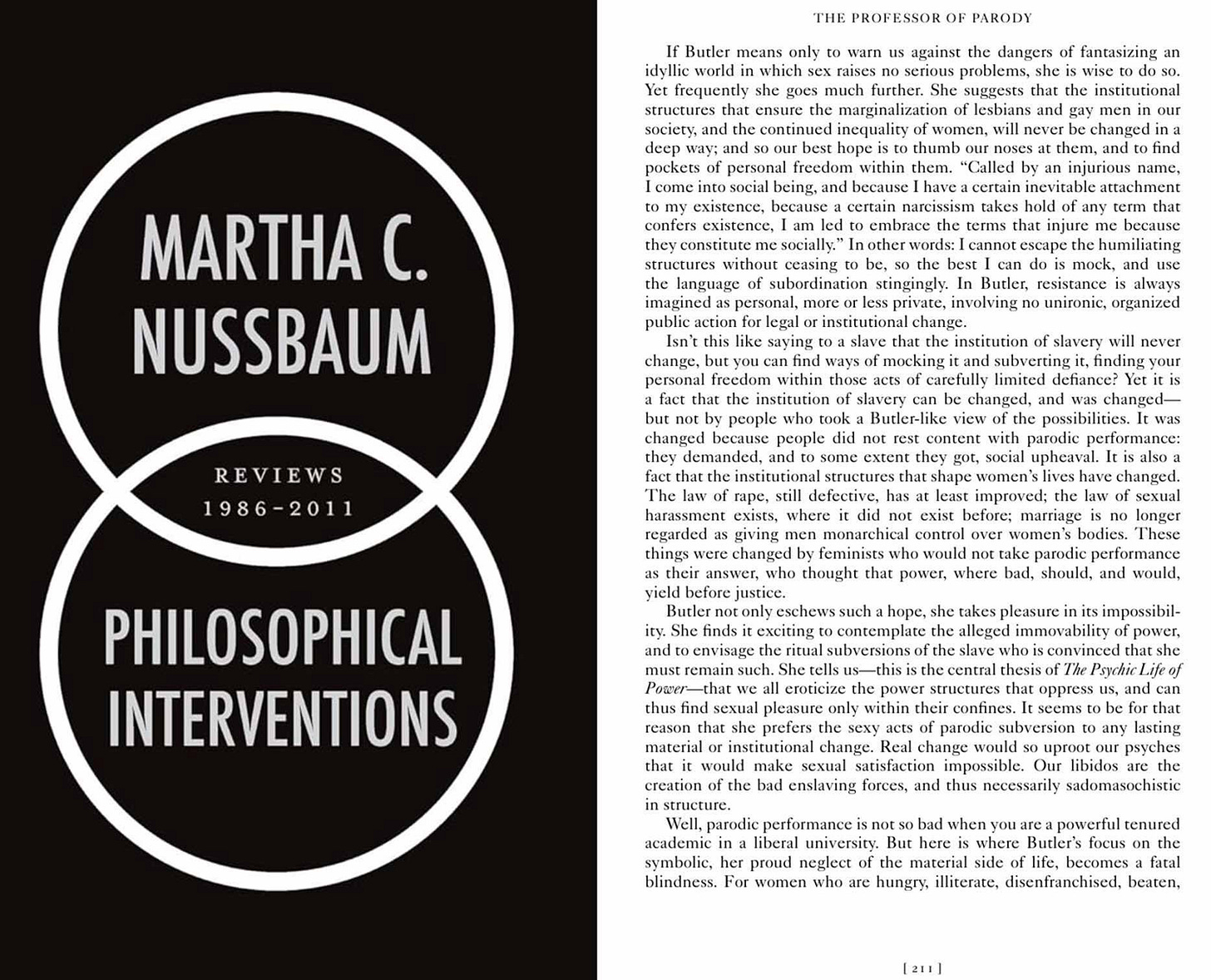
Reading Nussbaum’s criticism of Butler, it seems queer how Dijk’s arguments resemble Butler’s 1997 Psychic Life of Power, which, alongside her other 1990s works, follows Gender Trouble in using Lacanian psychoanalysis. Here is a passage from Butler’s book:
The Althusserian use of Lacan centers on the function of the imaginary as the permanent possibility of misrecognition, that is, the incommensurability between symbolic demand (the name that is interpellated) and the instability and unpredictability of its appropriation. If the interpellated name seeks to accomplish the identity to which it refers, it begins as a performative process which is nevertheless derailed in the imaginary, for the imaginary is surely preoccupied with the law, structured by the law, but does not immediately obey the law. For the Lacanian, then, the imaginary signifies the impossibility of the discursive—that is, symbolic—constitution of identity. Identity can never be fully totalized by the symbolic, for what it fails to order will emerge within the imaginary as a disorder, a site where identity is contested.32 (emphasis added)
What Nussbaum writes of Butler seems applicable to Dijk’s view of women “fetishizing” men oppressing them and “fantasizing” their oppression as women into existence. The view that we all eroticize oppression, but can never overcome it, derives from Lacanian psychoanalytic theory and has been expressed in postmodernist approaches to oppression at the expense of the oppressed. Dijk may see herself in opposition to Butler, but these two women’s appropriations of Lacan actually lead them to similar conclusions in opposition to feminism and feminists—despite these women claiming otherwise. In other words, Butler and Dijk have bought their drugs from the same dealer, so it should be of no surprise when their work operates along similar lines. Reading Freud, Lacan, and Butler, it seems more than evident that Dijk has reproduced, perhaps unconsciously, the worst from their work.
Since Jennifer Bilek and Julian Vigo do “investigative reporting,” why have they not investigated the serious issues with Dijk’s “critique of feminism” they have gleefully promoted and enabled in trashing feminism and feminists?
Hitherto it has been said that a period of sexual liberty precedes a period of degeneration— The present tendency toward sex liberation should—understandingly and purely directed—inaugurate a period of regeneration.
If as Freud infers—Religion and Sex are interchangeable—why not reintegrate both giving the people an impetus toward the equilibrium they require?
Sexual myths become the masters of civilization.
- Mina Loy, “Censor Morals Sex.” c. 192033
If you are unable to become a paid subscriber through Substack, then please feel free to donate via PayPal, if able. I am grateful for reader support!
See Daniel Goleman, “As a Therapist, Freud Fell Short, Scholars Find,” The New York Times, March 6, 1990, C1, C12.
Mina Loy, “Conversion,” c. 1930, in Stories and Essays of Mina Loy, ed. Sara Crangle (Champaign, IL: Dalkey Archive Press, 2011), 227.
Sigmund Freud to C.G. Jung, June 14, 1907, in The Freud/Jung Letters: The Correspondence Between Sigmund Freud and C.G. Jung, ed. William McGuire, trans. Ralph Manheim and R.F.C. Hull (Princeton University Press, 1974), 64. For a discussion on how Freud’s psychoanalysis resembles Alfred Kinsey’s sexology, see Andrea Dworkin, Pornography: Men Possessing Women, 1981 (New York: Plume, 1989), 181.
Andrea Dworkin, “Look, Dick, Look. See Jane Blow It.” 1979, in Letters from a War Zone (New York: Lawrence Hill Books, 1989/1993), 127.
Noam Chomsky, December 2012, in “Noam Chomsky Slams Žižek and Lacan: Empty ‘Posturing,’” Open Culture, June 28, 2013, https://www.openculture.com/2013/06/noam_chomsky_slams_zizek_and_lacan_empty_posturing.html.
Somer Brodribb, Nothing Mat(t)ers: A Feminist Critique of Postmodernism (North Melbourne, Australia: Spinifex Press, 1992), 99.
Mary Daly, Beyond God the Father: Toward a Philosophy of Women’s Liberation, 1973 (Boston: Beacon Press, 1985), 8.
Jacques Lacan, “The Function and Field of Speech and Language in Psychoanalysis,” 1953, in Écrits, 1966, trans. Bruce Fink, with Héloïse Fink and Russell Grigg (New York: W.W. Norton & Company, 2006), 228-229. Foundational to Lacanian psychoanalytic theory, this 1953 work marked the formation of Lacan’s school of psychoanalysis distinct from prevailing Freudian and Jungian psychoanalytic approaches. Apart from being word salad, this paper introduces Lacan’s theory of the three interacting orders—“the Symbolic,” “the Imaginary,” and “the Real,” all concepts integral to Lacanian psychoanalytic theory.
Judith Butler, Gender Trouble: Feminism and the Subversion of Identity, 1990 (New York: Routledge, 2010), 38.
Mina Loy, “History of Religion and Eros,” c. 1950, in Stories and Essays, 252.
Joreen/Jo Freeman, “Trashing: The Dark Side of Sisterhood,” Ms. 4, no. 10 (April 1976): 94.
Joreen/Jo Freeman, “Trashing,” 94, 97.
Tara van Dyke, Facebook, July 9, 2022, https://www.facebook.com/share/1ZPRMF7e6Q.
Tara van Dyke, Facebook, August 28, 2022, https://www.facebook.com/share/p/1XuzsNkQHH.
Renate Klein, “The ‘Men-Problem’ in Women’s Studies: The Expert, the Ignoramus, and the Poor Dear,” 1983, in Radical Voices: A Decade of Feminist Resistance from Women’s Studies International Forum, eds. Renate D. Klein and Deborah Lynn Steinberg, (Oxford: Pergamon Press, 1989), 116.
Tara van Dyke, Facebook, January 17, 2022, https://www.facebook.com/share/1NwARdtBFV.
Tara van Dyke, Facebook, May 19, 2022, https://www.facebook.com/share/15X2N7FJzR.
Tara van Dyke, Facebook, July 5, 2022, https://www.facebook.com/share/p/14mYxpn2Qc.
Andrea Dworkin, “The Root Cause,” 1975, in Our Blood: Prophecies and Discourses on Sexual Politics, 1976 (New York: Perigee Books, 1981), 100.
See Luis Suarez-Villa, Technocapitalism: A Critical Perspective on Technological Innovation and Corporatism (Philadelphia: Temple University Press, 2009).
Friedrich Engels, Der Ursprung der Familie, des Privateigenthums und des Staats (The Origin of the Family, Private Property, and the State), 1884 (New York: International Publishers, 1993), 139.
Maria Mies, Patriarchy and Accumulation on a World Scale: Women in the International Division of Labour, 1986 (Spinifex Press, 2014), 106. See, in general, “Colonization and Housewifization,” 74-111.
Mies, 215.
Alfred Schmidt, Der Begriff der Natur in der Lehre von Marx (The Concept of Nature in Marx), 1962 (New York: Verso, 2014), 147.
See Mies, 213-216, for a critique of Marx’s concept of labor and the outsourcing of labor to man-made technology.
Mina Loy, “The Oil in the Machine?” 1921, in Stories and Essays, 285.
Simone de Beauvoir, Le deuxième sexe (The Second Sex), 1949, trans. Constance Borde and Sheila Malovany-Chevallier, 2009 (New York: Vintage Books, 2011), 49.
Andrea Dworkin, Mercy, 1990 (New York: Four Walls Eight Windows, 1992), 337.
Daly, Beyond God the Father, 4.
Tara van Dyke, Facebook, May 5, 2022, https://www.facebook.com/share/1NWHngiFW4.
Martha C. Nussbaum, “The Professor of Parody,” The New Republic, February 22, 1999, reprinted in Nussbaum, Philosophical Interventions, Reviews 1986-2011 (New York: Oxford University Press, 2012), 211.
Judith Butler, The Psychic Life of Power: Theories in Subjection (Stanford: Standford University Press, 1997), 96-97.
Mina Loy, “Censor Morals Sex.” c. 1920, in Stories and Essays, 226.




